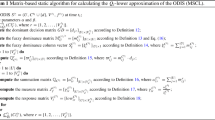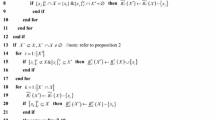Abstract
Based on multi-dominance discernibility matrices, an incremental algorithm INRIDDM is proposed by means of dominance-based rough set approach. For the incremental algorithm, when a new object arrives, after updating one row or one column in the matrix, we could get the updated rule sets. Computation analysis and experimental results show that the incremental algorithm INRIDDM is superior to other non-incremental algorithms on dealing with large data sets.
Preview
Unable to display preview. Download preview PDF.
Similar content being viewed by others
References
Greco, S., Matarazzo, B., Slowinski, R., Stefanowinski, J.: An algorithm for induction of decision rules consistent with the dominance principle. In: Proceedings of Rough Sets and Current Trends in Computing, pp. 304–313 (2000)
Greco, S., Slowinski, R., Stefanowski, J., Zurawski, M.: Incremental versus non-incremental rule induction for multicriteria classification. In: Peters, J.F., Skowron, A., Dubois, D., Grzymała-Busse, J.W., Inuiguchi, M., Polkowski, L. (eds.) Transactions on Rough Sets II. LNCS, vol. 3135, pp. 33–53. Springer, Heidelberg (2004)
Jia, X.Y., Shang, L., Chen, J.J.: Rule induction algrithom based on dominance-based on rough set approach (in Chinese). Journal of Jiangnan University (Natural Science edn.) 6(6), 686–689 (2007)
Pawlak, Z.: Rough Sets. In: Theoretical Aspects of Reasoning about Data. Kluwer Academic Publishers, Dordrecht (1991)
Shan, N., Ziarko, W.: An incremental learning algorithm for constructing decision rules. In: Rough Sets, Fuzzy Sets and Knoledge Discovery, pp. 326–334. Springer, Heidelberg (1993)
Yao, Y.Y.: Mining high order decision rules. In: Rough Set Theory and Granular Computing, pp. 125–135 (2003)
Yao, Y.Y., Zhou, B., Chen, Y.H.: Interpreting low and high order rules: a granular computing approach. In: Kryszkiewicz, M., Peters, J.F., Rybiński, H., Skowron, A. (eds.) RSEISP 2007. LNCS (LNAI), vol. 4585, pp. 371–380. Springer, Heidelberg (2007)
Author information
Authors and Affiliations
Editor information
Editors and Affiliations
Rights and permissions
Copyright information
© 2009 Springer-Verlag Berlin Heidelberg
About this paper
Cite this paper
Jia, X., Shang, L., Chen, J., Dai, X. (2009). An Incremental Rule Induction Algorithm Based on Ordering Relations. In: Wen, P., Li, Y., Polkowski, L., Yao, Y., Tsumoto, S., Wang, G. (eds) Rough Sets and Knowledge Technology. RSKT 2009. Lecture Notes in Computer Science(), vol 5589. Springer, Berlin, Heidelberg. https://doi.org/10.1007/978-3-642-02962-2_21
Download citation
DOI: https://doi.org/10.1007/978-3-642-02962-2_21
Publisher Name: Springer, Berlin, Heidelberg
Print ISBN: 978-3-642-02961-5
Online ISBN: 978-3-642-02962-2
eBook Packages: Computer ScienceComputer Science (R0)




